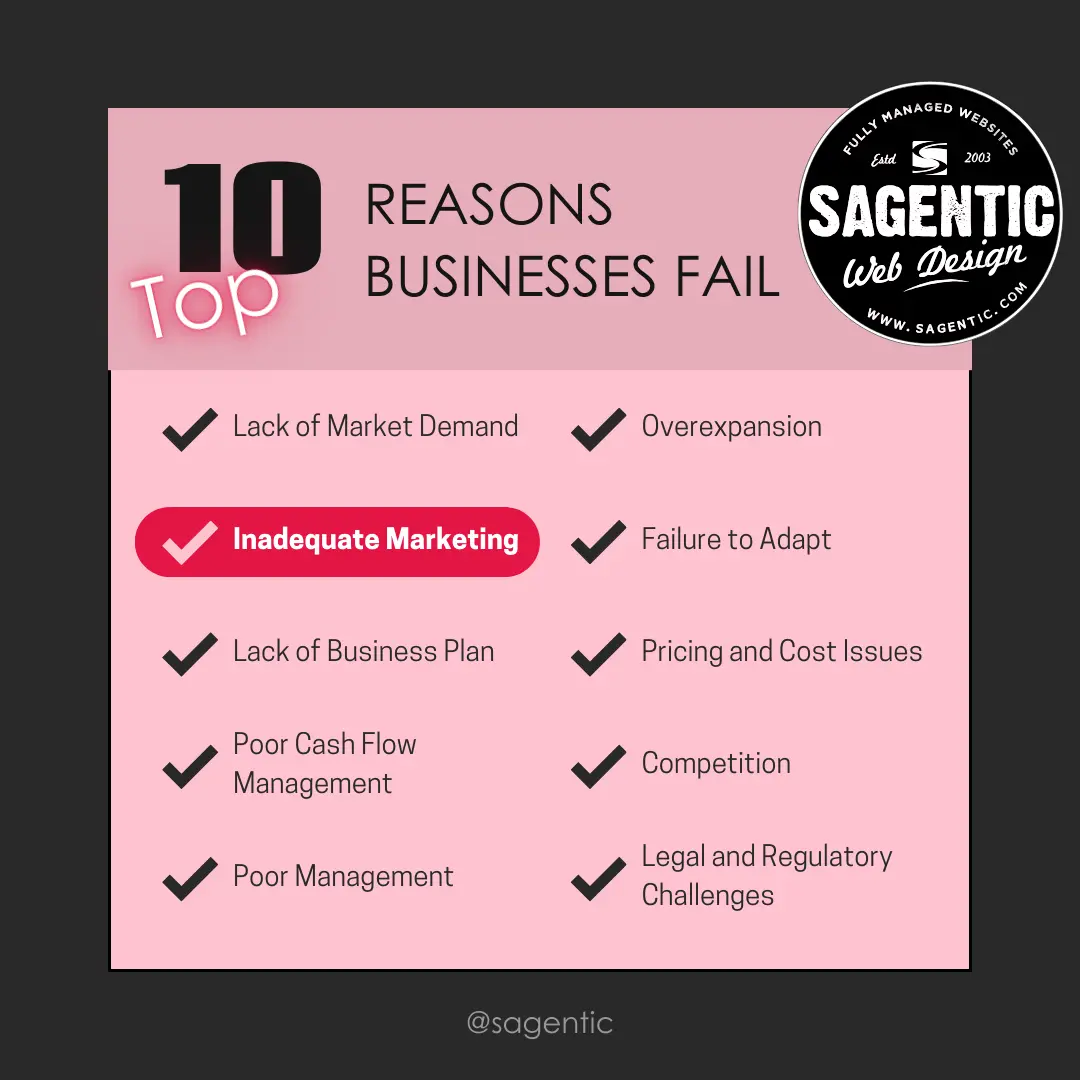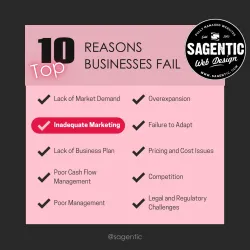 As a business owner or entrepreneur, the road to success is often filled with obstacles. While passion and hard work are essential, understanding the common reasons why businesses fail can help you avoid the pitfalls that derail so many ventures. With this knowledge, you can build a more sustainable, profitable, and adaptable business.
As a business owner or entrepreneur, the road to success is often filled with obstacles. While passion and hard work are essential, understanding the common reasons why businesses fail can help you avoid the pitfalls that derail so many ventures. With this knowledge, you can build a more sustainable, profitable, and adaptable business.
In this article, we’ll dive into the top 10 reasons businesses fail and offer strategies to help you navigate these challenges. Whether you’re just starting or looking to take your business to the next level, this guide is for you.
1. Lack of Market Demand
One of the primary reasons businesses fail is a lack of market demand. Simply put, if there isn’t a strong enough need for your product or service, your business will struggle to generate sales.
Many entrepreneurs are so passionate about their idea that they skip thorough market research, only to discover later that their target market either doesn’t need or isn’t willing to pay for what they’re offering.
How to Avoid This:
- Conduct thorough market research before launching your business.
- Validate your product or service with real customers through surveys, focus groups, or beta testing.
- Continuously assess and pivot based on market feedback to ensure your offerings remain relevant.
2. Inadequate Marketing
Even the best products and services won’t succeed if no one knows about them. Inadequate marketing is now the #2 reason businesses fail, and it’s easy to see why. In today’s digital landscape, businesses need strong, strategic marketing efforts to stand out in a crowded market.
Many small businesses rely on word of mouth or outdated marketing methods, missing out on the massive potential of digital marketing channels like SEO, social media, content marketing, and email campaigns. Without a comprehensive marketing plan, businesses risk being invisible to their target audience.
How to Avoid This:
- Develop a strong digital marketing strategy that includes SEO, social media, and paid advertising.
- Build a compelling brand that resonates with your audience. Your branding should be consistent across all platforms.
- Invest in content marketing to engage your audience and build trust. Blogging, video content, and social media updates can all drive traffic and conversions.
- Use analytics to track marketing performance and adjust your strategies based on data.
Remember, marketing isn’t just about getting noticed; it’s about driving action. A well-executed social media marketing plan turns potential customers into loyal clients.
3. Poor Cash Flow Management
Poor cash flow management is a silent killer for many businesses. Even profitable companies can fail if they don’t manage their cash flow properly. It’s essential to balance incoming revenue with outgoing expenses to ensure your business has the liquidity to cover daily operations.
How to Avoid This:
- Keep close tabs on your cash flow with detailed financial tracking and forecasting.
- Prioritize prompt invoicing and payment collection from clients.
- Maintain a reserve fund to handle unexpected expenses or slow periods.
- Consider working with a financial advisor or accountant to optimize your cash flow strategies.
4. Lack of Business Plan
Many businesses fail because they lack a clear and actionable business plan. A solid business plan is not just for securing funding from investors; it serves as a roadmap for your business. It helps you set goals, establish strategies, and anticipate challenges.
How to Avoid This:
- Develop a detailed business plan that includes your mission, goals, marketing strategy, financial projections, and operational plans.
- Regularly revisit and adjust your business plan as your business grows and the market evolves.
5. Poor Management
The quality of leadership in a business can make or break its success. Poor management decisions, such as inadequate delegation, micromanagement, or lack of clear communication, can demotivate employees and create operational inefficiencies.
How to Avoid This:
- Hire or develop strong managers who can lead and inspire teams.
- Encourage ongoing leadership training to improve decision-making and team management skills.
- Empower your team through delegation and trust, allowing them to take ownership of their work.
6. Overexpansion
Expanding too quickly without proper planning can strain resources, dilute your brand, and increase operational risks. Many businesses mistakenly expand into new markets, launch new products, or open additional locations without ensuring that their core operations are solid.
How to Avoid This:
- Focus on sustainable growth by thoroughly researching new markets or opportunities before expanding.
- Scale at a manageable pace and ensure your financial and operational infrastructure can support growth.
- Test new markets with pilot projects before committing fully.
7. Failure to Adapt
In today’s fast-paced market, businesses that fail to adapt often fall behind. Whether it’s technological advancements, changing customer preferences, or new competitors, staying agile is essential for long-term success.
How to Avoid This:
- Foster a culture of innovation and continuous learning within your company.
- Stay up-to-date with industry trends and be willing to pivot your business model when necessary.
- Regularly seek customer feedback to stay aligned with their evolving needs.
8. Pricing and Cost Issues
Setting the wrong price for your products or services can alienate customers or erode your profit margins. Similarly, failing to control operational costs can lead to financial strain, even if your sales are strong.
How to Avoid This:
- Conduct a thorough cost analysis to understand the true cost of delivering your product or service.
- Use competitive pricing strategies that reflect market conditions while ensuring profitability.
- Regularly review and adjust your pricing as needed based on market changes.
9. Competition
Failing to differentiate your business from competitors can make it difficult to stand out in the market. Too many businesses underestimate the strength of their competitors, leading to a loss of market share.
How to Avoid This:
- Conduct a thorough competitive analysis to identify your competitors' strengths and weaknesses.
- Focus on what makes your business unique and communicate that clearly to your customers.
- Build a strong brand and customer experience to foster loyalty and reduce the risk of losing clients to competitors.
10. Legal and Regulatory Challenges
Navigating legal and regulatory requirements is critical for long-term success. Failing to comply with industry laws and standards can result in fines, lawsuits, and even the closure of your business.
How to Avoid This:
- Stay informed about the laws and regulations that affect your industry.
- Consult with legal professionals to ensure your business is compliant with all relevant regulations.
- Regularly review your contracts, employee agreements, and business practices to minimize legal risks.
Understanding why businesses fail is the first step toward ensuring your own success. By focusing on these common pitfalls and taking proactive steps to address them, you can build a more resilient business that thrives in today’s competitive market.
Whether it’s developing a comprehensive marketing strategy or improving cash flow management, being aware of potential challenges allows you to create strategies that drive growth. If you’re looking to strengthen your business, especially in the area of marketing, Sagentic Web Design is here to help. Our expert team can work with you to build a custom marketing plan that gets your business noticed.
Ready to take your business to the next level? Contact Sagentic Web Design today to learn how we can help with marketing strategies, web design, and much more.

